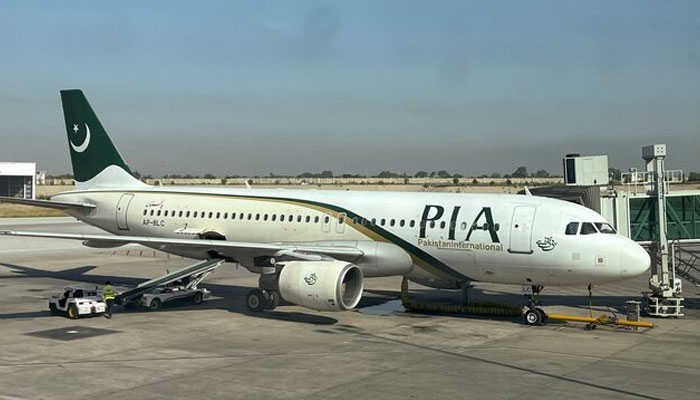
The latest attempt to privatise Pakistan International Airlines (PIA) faced a setback on Sunday, with former interim minister for privatisation, Fawad Hassan Fawad, expressing shock over the federal government’s decision to move forward with only one bidder in the process.
In a discussion with journalist Saleem Safi on Geo News’ programme Jirga, Fawad voiced his concerns, particularly about the lack of competitive bidders and the chosen bidder's lack of experience in aviation.
The privatisation process, aimed at alleviating the financial strain of Pakistan’s national carrier, saw a sole bidder, Blue World City, offering Rs10 billion for a 60% stake in PIA. However, this offer was far below the government’s minimum asking price of Rs85 billion. Blue World City’s refusal to negotiate further effectively dashed the government’s hopes for a timely sale.
The Cabinet Committee on Privatisation had previously given the green light for this final auction, which was held on October 30. This failed bid marked Pakistan’s second unsuccessful attempt to privatise the ailing airline, the first being in 2015, which also ended prematurely.
Fawad criticised the cabinet's approach to the privatisation effort, questioning the need for a bidding process when only one bidder was available, especially one lacking any aviation industry background. “What was the need for bidding if there was only a sole bidder who does not have an aviation background? This process harmed the entire privatisation effort,” he remarked, signalling his frustration with the recent developments.
According to Fawad, the failure to attract multiple bids stemmed from a “lack of decision-making” within the government. He stressed the importance of strategic decision-making to ensure a successful privatisation process. “The privatisation process can’t be completed until you make the right decision at the right time,” he said, underscoring his belief that hesitation and delay had undermined the initiative.
Reflecting on his tenure as privatisation minister, Fawad highlighted his contributions to advancing PIA's privatisation, noting that substantial steps were taken only after September 2023. “For the first time in [Pakistan’s] history, we initiated the privatisation of PIA. There was no meaningful work in this regard before September 2023,” he claimed, pointing to the inaction of prior administrations.
During his initial weeks in office, Fawad observed a lack of urgency within the Aviation Division regarding PIA’s privatisation. In response, he took control of PIA’s finances, aiming to address the airline’s debt and financial challenges. He oversaw the restructuring of PIA, including renegotiating Rs281 billion in debt from domestic and international banks, capping the interest rate at 12% and saving the airline an estimated Rs35 billion annually.
The privatisation of PIA has long been a contentious issue in Pakistan. Former finance minister Miftah Ismail, also speaking on Jirga, criticised Prime Minister Shehbaz Sharif and Deputy Prime Minister Ishaq Dar for their lack of commitment to privatising state-owned entities. “Neither Shehbaz Sharif has any track record of undertaking privatisation [of any state-owned entity] nor any intention,” he stated, indicating scepticism regarding the PMLN government’s sincerity in tackling the complex challenges facing PIA.
Ismail also voiced strong opposition to the idea of provincial governments, specifically those of Khyber Pakhtunkhwa and Punjab, attempting to acquire PIA. He argued that government-run airlines are a thing of the past, asserting that “no government in the world operates airlines.” During a recent appearance on Geo News’ Naya Pakistan, Ismail questioned the provinces’ intentions to run an airline, saying, “We don’t know how to run a police station, what is the need to operate an airline.” He argued that provincial governments should prioritise basic services such as education, healthcare, and infrastructure over managing an airline.
Ismail also took issue with the provinces’ reliance on federal financial support, stating that they seek assistance from the Centre without contributing significantly in tax revenues. He highlighted the problematic “pre-requisitions” set by the government for the PIA privatisation, which he claimed discouraged potential buyers from participating in the process.
The privatisation of PIA has been a long-standing objective for Pakistan’s successive governments, who view it as a means to ease the financial burden on the national treasury. However, the airline’s persistent financial woes, operational inefficiencies, and bureaucratic complexities have repeatedly hindered progress. With the failure of this latest bid, the government faces renewed pressure to reassess its approach to ensure a more effective and competitive privatisation process, one that might finally lead to a sustainable future for the struggling national carrier.
This recent setback underscores the challenges of privatising a major state-owned enterprise with significant financial, operational, and political entanglements. The path forward remains uncertain, with officials needing to balance privatisation goals against the necessity of retaining a competitive and competent bidder pool, all while addressing the concerns of various stakeholders across Pakistan.
















